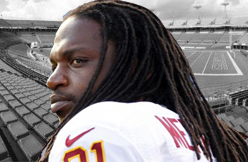Aug/28/14 10:47 PM Filed in:
Brandon MeriweatherIn the course of strongly defending suspended teammate Brandon Meriweather this week, Washington safety Ryan Clark also took a jab at Troy Vincent, the longtime defensive back who’s now the NFL executive vice president of football operations.
“It’s tough,” Clark said, via ESPN.com. “You get a guy who played ball, even though I think Troy Vincent played it softly, he didn’t play as aggressive and violent as Brandon. Maybe that’s part of it, not having that mind-set. It’s just sad.”
Is it smart to take a personal shot at the guy responsible for judging future Redskins hits? That’s for wiser minds to decide. Regardless, Vincent — who spent the last year of his career playing for Washington — went on NFL Network on Tuesday to explain his Meriweather decision. And he was asked if it’s hard for him, as a former defensive back, to come down on defensive backs.
“It’s not difficult for me,” Vincent said. “I believe that I have the [wherewithal], the professionalism and the athleticism at the time — a good understanding, a practical understanding of what it takes to play the position. And again, I’m going back to 2009 in Brandon’s situation — and just looking at the progression, what we’ve seen, there has been no altering in his play, his style of play.
“And frankly, some of the acts are impermissible: the helmet-to-helmet blows, hitting in that head, that shoulder and neck area, are impermissible,” Vincent said. “We want to remove that from the game, and we want to protect Brandon himself, and we want to protect his opponents from unnecessary risks.”
In explaining how the decision was made, Vincent said that officials viewed footage of Meriweather both from this month and from the past.
“Brandon has been someone that has been in this particular [situation] multiple times,” Vincent said. “We’ve just cited the four or five most recent. But in this particular case, Brandon hit a player in that area that we consider a very sensitive area, which is that head and neck area. So we went back from 2009 to current, and this is technique that we want to remove from the game.”

(washingtonpost.com)



